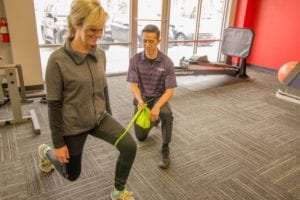Overview: Patellar tendinitis, also known as “jumper’s knee,” is an injury of the patellar tendon, the tendon that connects your kneecap to your shinbone. The patellar tendon will become inflamed and tender due to repetitive motions or overuse. It is most commonly seen in people who participate in distance running, basketball, volleyball, or other sports that involve frequent jumping. However, people who do not participate in sports can also suffer from patellar tendinitis.
Symptoms: Pain usually starts out as a dull ache as you start an activity or just after an intense workout. If not treated pain can become more intense and you may notice it while going downstairs, getting out of a chair, or even at rest. You may also notice some swelling around the knee cap during or after activity.
Risk Factors:
- Activities such as running and jumping are commonly associated with patellar tendinitis. Sudden increases in frequency or intensity of activity can also increase stress on the tendon and lead its inflammation.
- Tight muscles in the front of your thigh (quadriceps) or in the back of your leg (hamstrings).
- Muscle strength imbalances can cause stress on the knee if they pull unevenly on the tendon.
When to see a doctor: Self-treatment of rest and ice can be used when you start to notice symptoms. Call your doctor if your pain continues or becomes worse and is preventing you from performing your daily routine.
How PT can help: A variety of techniques can be used to help reduce the symptoms associated with patellar tendinitis, including:
- Stretching exercises to decrease muscle tension and stress on the tendon.
- Strengthening exercises for the entire leg, hip, and core. Exercises that involve slowly lowering or extending the knee are especially helpful.
- Ice, “e-stim” (electrical stimulation), and other modalities can be used to help decrease pain and inflammation in the knee.
- Education on proper techniques for lifting, jumping, running to decrease the stress on the tendon with sports-related activities.
Take the time to contact any of our clinic locations to talk with our expert or to schedule a complimentary consultation.
Rachel Heyl PT, DPT, OCS

